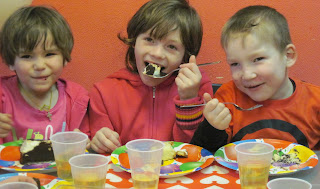Alexander, ten, nicknamed Sasha, arrived in Moscow in January for his second trip with the Lighthouse Project. Nobody chose to host him in November, a fate relived in January though I’d promoted him aggressively as my favorite November child. We held hands the first day; as he looked up at me, eyes expectant, I was charmed again by his quiet personality, but rueful of his selection of me, given my family’s lack of adoption ambitions. Day two, Sasha played his hand differently, spending time with a family visiting another child. Day three, in the common room, hosts were occupied with those they’d come to meet. Though I hardly begrudged them this, I grieved Sasha’s desperation as he stood in the middle of the room alone, his glance pinball-like, visually seizing each family in turn with an expression imploring anyone to choose him. While other kids, more flamboyant, had hosts applauding their every move, Sasha was thoughtful, genuine, and unheralded. The last day, when the kids essayed about their trip, presenting their work to their families in a poignant meeting, Sasha’s eyes darted around the room one final frantic time before bringing his paper to me (Precious Jewels, 1/21/10).
Concerned he was unhosted, a kindly soul from America sent a bag of gifts for him, but lost luggage meant he received it only just before his departure. His orphanage photo was tied to the bag’s drawstrings like a pictorial luggage tag. Toting the bag into the hotel stairwell as he trudged to the van for the ride to the train station, he saw my dear friend there. Looking at Elaine, then the photo tag, then Elaine, he tore the photo off, pressed it into her hand, and earned a hug for his gesture.
His yearning to be wanted was evident, but for all his earnestness, Sasha won no hearts besides mine. I fall for many kids, but Sasha was the first child since my own Russian adoption who I envisioned in my home, as my own son. Back in Grand Rapids, I sung his praises to my husband, who’d just spent several days alone caring for our four kids. He felt for Sasha, but felt stronger that his family was elsewhere.
Elsewhere, in Florida, days before Christmas, Tracy wept throughout the Dave Thomas adoption program on television. Finding the Lighthouse Project link on their website, she visited, and liked what she saw. Requesting information on Christmas Day, she was surprised I called the next day, and nervous since her husband Doug had no idea she’d been querying about adoption. Our rapport was swift, though, and I appreciated her insightful questions. When Doug got home from work, she confessed her interest in the Lighthouse Project. “I think it’s a great idea,” he agreed. “Show me the website.” Our January trip only a few days off, they opted to travel in March. When I returned from the January trip, Sasha heavy on my heart, I encouraged them to consider him.
Their son Chris had been asking them to adopt for years; even as a little boy, he’d wanted nothing more than a sibling. When they finally began entertaining thoughts of adoption, brochures and e-mails from adoption agencies appeared, solicited by a teenaged Chris. Into adulthood, he urged his parents to adopt. At work outside the country, he was due back in the United States the same day our group was leaving Moscow. Tracy believed her son’s homecoming trumped our trip, but Chris disagreed, insisting she and Doug go meet Sasha. Still torn when they heard a sermon at church on leaving the comfort zone to follow God’s leading, Tracy exited the service that day in tears. It sealed the deal; walking out, Doug exulted, “We’re going, aren’t we!” For several years, the couple felt something was missing, but a week before departure, Tracy confided even though the same two people and the same dog still lived in the same house, everything felt richer, and full of life.
When they arrived in Moscow, Sasha was waiting at the hotel. I introduced them to him, but my Russian was insufficient to explain why they’d come. On our walk to the zoo that afternoon, Sasha flitted from family to family, understandably playing the field to better his odds. At the zoo, I wasn’t sure he knew yet Doug and Tracy were “his”. In front of the frozen duck pond, I asked him for a photo, and then suggested Doug and Tracy join him. As their arms engulfed him, he recognized them. I saw it. Inseparable the rest of the week, watching them together brought me more satisfaction than I’d ever experienced in all the other joys with the program. So deserving for so long, every smile I saw him smile, every time I saw he realized he had parents to show some childish treasure, was worth every sleepless night I’ve poured into the Lighthouse Project.
I loved Sasha enough he might have been mine, but God had another family in store. So He blessed me enough to help me find them, then let me watch them fall in love.
It was the next best thing.
Tweet


.JPG)









